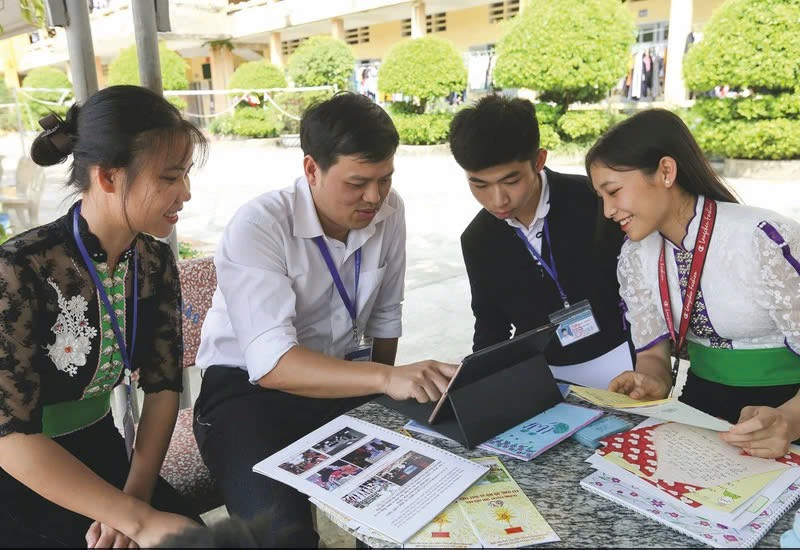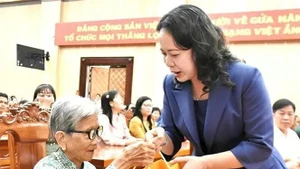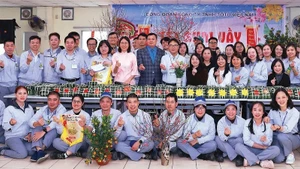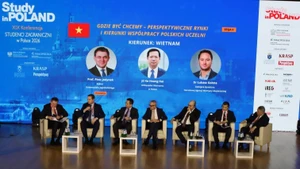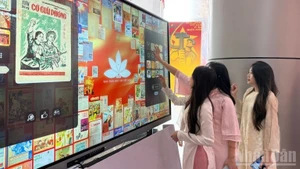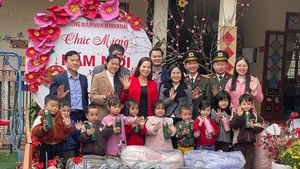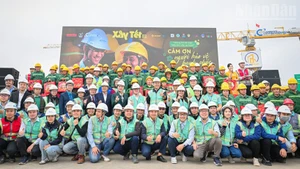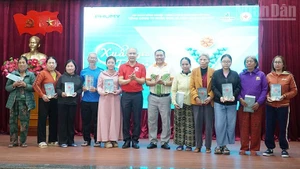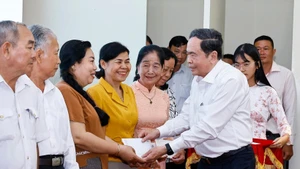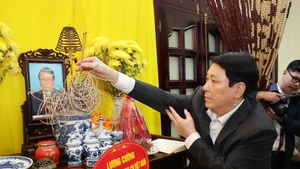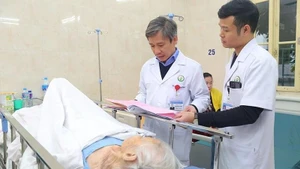Cu Huy Hoan, Deputy Director of the Department of Education and Training of Dien Bien Province, said that among the 18 ethnic minorities in Dien Bien Province, the Thai ethnic group accounts for 35.69% of the province’s total population, while the H’Mong ethnic group accounts for 38.12%. These are two ethnic communities with a long history of residence in Dien Bien Province, as well as in the Northwest region in general.
Facing the risk of the loss of the spoken and written languages of the Thai and H’Mong ethnic groups, since 2011, the People’s Committee of Dien Bien Province has decided to issue a Project on teaching Thai and H’Mong languages to primary and secondary school students in the area.
The historical factor of residence has created a richer cultural and spiritual life for these two ethnic groups than other ethnic groups. In addition to their own languages, both the Thai and H’Mong ethnic groups in Dien Bien have their own written languages and some people are fluent in their ethnic languages.
However, very few young people of both ethnic groups know or care about their own written languages; even in favourable areas, such as the centres of districts, towns or the basins around the city, many students and young people of the Thai ethnic group do not speak their mother tongue fluently because they are rarely used in daily communication.
Facing the risk of the loss of the spoken and written languages of the Thai and H’Mong ethnic groups, since 2011, the People’s Committee of Dien Bien Province has decided to issue a Project on teaching Thai and H’Mong languages to primary and secondary school students in the area. Dien Bien Province also set a goal of fostering love for the homeland, pride in culture and national traditions for each student and all people in the area.
Since the 2011-2012 school year, the Department of Education and Training of Dien Bien Province has directed the selection of 40 primary schools in areas with a large population of Thai and H’Mong ethnic groups in the districts of Tuan Giao, Tua Chua, Dien Bien Dong, and Muong Cha to pilot the teaching of Thai and H’Mong languages to third-grade students.
Teacher Do Van Son, Head of the Department of Education and Training of Tuan Giao District, said: In the first year of implementing the project of teaching Thai and H’Mong languages to primary school students, Tuan Giao District only had two schools with four classes with a total of 85 students learning Thai; and 1 school with 2 classes with a total of 48 students learning H’Mong ethnic language.
At first, not only was there a shortage of teachers, but both teachers and students faced obstacles. In fact, the language alone is very different because although they are of the same Black Thai ethnic group, in each locality and district, people have different pronunciations, not to mention the differences between the Black Thai ethnic group and the White Thai ethnic group. The H’Mong language is even more difficult because although they are of the same ethnic group, they are divided into many branches, such as: Mong do, Mong lenh, Mong si, etc.
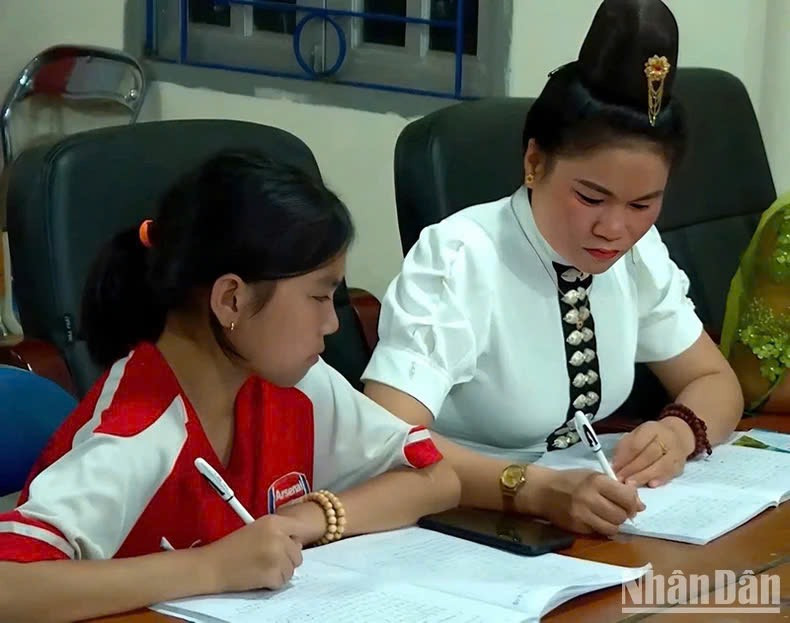 |
| Not only students, many parents who are Thai ethnic people in Dien Bien District (Dien Bien Province) have voluntarily participated in the Thai ethnic writing classes organised by the provincial education and training sector. |
At first, teachers teaching Thai and H’Mong languages in Tuan Giao District had to research and compile separate lessons for students to easily absorb and use. Before each lesson, teachers went to the base to meet with the elderly and prestigious people who know the languages and writings of the two ethnic groups to consult their opinions, and at the same time learn the correct pronunciation of each ethnic group.
Cu Huy Hoan shared that due to the lack of language teachers, many schools have had to contract retired teachers and officials to teach the Thai ethnic language.
The Department of Education and Training of Dien Bien Province has directed members of the Compilation Council to edit documents based on the framework of the Ethnic Language Programme to meet the requirements of forming and developing listening, speaking, reading and writing skills for students. It is also guiding education departments to select Thai language teachers who are Thai ethnic people and H’Mong language teachers who are H’Mong ethnic people who are teaching at primary and secondary schools in the area to participate in ethnic language training courses.
Thanks to the synchronous direction, timely support in terms of materials and resources from the People’s Committee of Dien Bien Province and the proactive spirit of overcoming difficulties of the team of teachers of Thai and H’Mong ethnic languages, the implementation of the project on teaching ethnic languages to ethnic minority students in Dien Bien Province in the 2011-2020 period has achieved impressive results.
The entire Dien Bien Province has taught the Thai ethnic language to 49,266 primary and secondary school students; similarly, 57,137 students have learned the H’Mong ethnic language. Every year, the rate of students completing the Thai and H’Mong ethnic language programme is from 98-99%.
Learning the spoken and written languages of ethnic groups has helped students understand more basic knowledge about the language and culture of ethnic groups, thereby gradually helping them practice thinking, supporting them with better learning methods in Vietnamese and other subjects.
In the 2020-2021 school year, Dien Bien Province decided to expand the number of primary schools teaching the Thai ethnic language to students of 29 schools with a total of 148 classes including 3,318 students; maintaining the teaching of the H’Mong ethnic language to students in 27 schools, with a total of 141 classes including 4,540 students.
At the secondary school level, 20 schools organised elective teaching of Thai ethnic language for 4,868 students; 23 schools taught elective teaching of H’Mong ethnic language for 4,362 students. With the Ministry of Education and Training officially introducing ethnic languages as an elective subject in the general education programme in 2018 (from grade 1 to grade 12 with a duration of 2 periods/week), the education sector of Dien Bien Province determined that it will continue to mobilise students and people to proactively register.
Furthermore, Dien Bien Province continues to mobilise resources to invest in facilities to meet the teaching and learning of ethnic minority languages according to regulations; pay attention to implementing policies and regimes for teachers and learners of ethnic minority languages according to current regulations and the regime to encourage the preservation of local ethnic culture.
